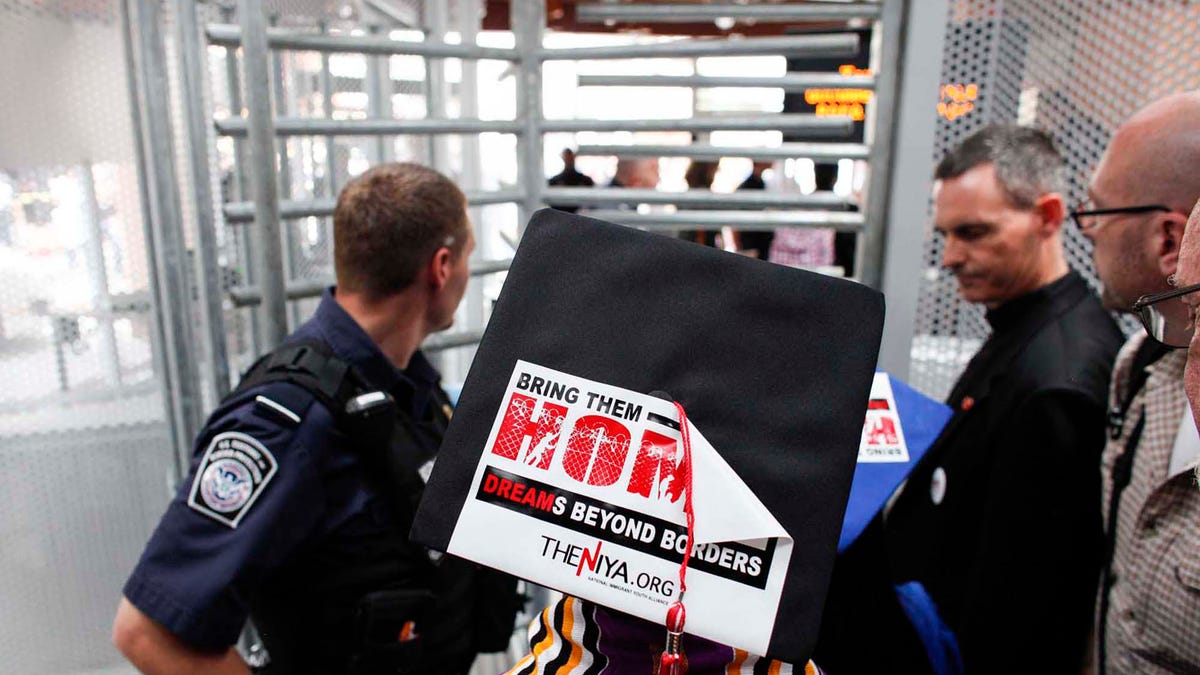
Dreamer is arrested in Nogales, Mexico. (AP Photo/Samantha Sais)
Will they be deported to their place of birth or released back to the American communities they've grown up in for most of their lives?
Nine activists, undocumented immigrants who were brought into the U.S. illegally as children, have been in federal custody in Arizona for more than a week after attempting to cross the border from Mexico into the U.S. in protest of American immigration policy and are awaiting word on whether they'll be granted asylum after interviews with authorities, organizers said Thursday.
Domenic Powell, a spokesman with the National Immigrant Youth Alliance, said the group is awaiting formal notification on their applications for humanitarian parole but is also seeking asylum based on "credible fear" of persecution should they return to Mexico.
Powell initially said earlier Thursday the parole requests had been denied, but later indicated the group's attorney had not yet received official word from U.S. authorities.
Should asylum be considered, the group may be released into the U.S. temporarily pending hearings before an immigration judge on their ability to remain.
The group, referring to themselves as the Dream9, is trying to call attention to hundreds of thousands who have been deported during President Barack Obama's time in the White House.
Tucson-based attorney Margo Cowan, who is representing the detainees, said she was asking that they be allowed to remain in the United States on what's known as humanitarian parole, essentially to permit admission to the country because "their presence in America will serve an important public interest."
Cowan didn't respond to requests for comment on Thursday.
Organizers of the protest with the National Immigrant Youth Alliance said Thursday that more than 70 women in the Eloy Detention Center where the activists are held have joined a hunger strike in solidarity. U.S. Immigration and Customs Enforcement officials denied the reports and say all individuals at the facility are eating three meals a day.
The office of U.S. Citizenship and Immigration Services is considering the group's request for asylum. Due to federal privacy laws, U.S. government officials declined to comment on the status.
The activists are pushing for legislation being considered in Congress to offer eventual citizenship to some immigrants brought illegally to the U.S. as children.
House Republicans recently took a tentative step toward offering citizenship to some unauthorized immigrants this week who fit into this category, but they hit resistance from the White House on down as Democrats said it wasn't enough.
The dismissive reaction to the Republican proposal underscored the difficulties of finding any immigration reform compromise in the Republican-led House.
The so-called DREAM Act, which aimed to provide just such a path to citizenship for those children, passed the House in 2010 when it was controlled by Democrats, but was blocked by Senate Republicans.
The nine activists spent portions of their lives in the U.S. Some returned voluntarily to Mexico years ago, while others had been deported. Three of them were raised in the U.S. and left the country for Mexico expressly to participate in the protest when they attempted to cross the border last week in Nogales.
Powell, the immigrant group spokesman, said that the federal government should release the nine activists and approve their requests.
The White House declined to comment.
Meanwhile, immigrant rights advocates disagree over whether the group's tactics are helping or hurting the cause.
David Leopold, an Ohio immigration attorney and former president of the American Immigration Lawyers Association, called the move a "publicity stunt" that distracts from ongoing discussion of immigration reform in Washington.
He called the group a "radical fringe of the Dreamers movement."
"I admire the passion of these people even though I don't agree with them," Leopold said, adding their movement could have been more effective if staged in Washington instead of putting themselves at risk of not being able to return to the U.S.
"When you walk outside the United States, that's the end of the ballgame," he said.
Requests for asylum may be tough to prove for at least the three activists who voluntarily left the U.S. as an act of civil disobedience, one of whom was set to begin law school in California this fall.
"It generally requires either a showing of past persecution or a well-founded fear of future persecution on account of race, religion, nationality or membership in a particular social group," Leopold said.
Brent Wilkes, the national executive director of the League of Latin American Citizens, disagrees that the group's move is a distraction, and says it instead puts human faces on the cause.
"I think they've pushed the envelope. Their aggressiveness on this front has really forced the issue," Wilkes said Thursday. "I just think they're really reframing this whole debate, whether we want it or not, and I think that's a good thing."
However, Wilkes said his group doesn't endorse such actions, and suggested many national organizations would likely be hesitant to support them, as well.
"We don't want to be seen as encouraging these folks to put their futures at risk and their opportunities to stay in the U.S.," Wilkes said.
Based on reporting by the Associated Press.
